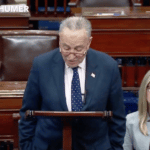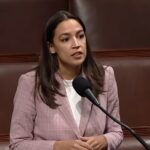

The established relationship between political candidates and influential unions has taken a surprising turn.
The Blaze reported that the International Association of Fire Fighters (IAFF) announced that it will refrain from endorsing any presidential contender this cycle, a break from tradition that may favor the campaigns of Donald Trump and JD Vance.
In a development that captured the political world, the IAFF revealed its decision last week not to back any candidate ahead of the upcoming election.
This is a marked change from 2020 when the IAFF quickly threw its support behind Joe Biden. The decision signifies shifting allegiances and a potential boost for Republican candidates.
Back in August, JD Vance, the Republican vice-presidential hopeful, faced hostility from union members. The incident, widely circulated on social media and drawn into the campaign discourse, highlighted tensions between Vance and some organized labor sectors.
Kamala Harris's campaign used Vance's reception by union members as a political point against him. A video clip showing the incident gained significant attention online, playing into broader media discussions about union politics and Republican candidates.
Now, with the IAFF refusing to endorse Harris, Harris's campaign isn't laughing about the Vance clip anymore.
The video of Vance being booed reached well beyond ordinary political circles, amassing millions of views and sparking debate. The Harris campaign used this footage to emphasize what it characterized as a disconnect between Vance and working Americans.
However, this recent move by the IAFF underscores potential shifts in sentiment among union members.
It poses questions about whether a broader trend could be emerging, particularly following similar positions taken by other unions such as the International Brotherhood of Teamsters.
Representatives from the IAFF did not explicitly outline reasons for withholding endorsement. However, it's likely that union membership is shifting conservative. Increasingly, union polling has suggested members' support leaning more rightward, with Trump gaining favor among some traditionally Democratic voting blocs.
Edward Kelly, the IAFF's general president, addressed the union's choice by spotlighting internal considerations. According to Kelly, ensuring unity within the organization was a deciding factor. He mentioned that the union had engaged in serious discussions, actively seeking insights from members regarding both candidates and policy issues.
Such introspective measures, Kelly said, guided the union's decision to avoid choosing sides. This choice represents a cautious approach aimed at self-preservation during a politically fractious time. In Kelly's words, the union's focus remains on strengthening cohesion among its members while encouraging everyone to voice their opinions at the polls.
Both the Trump and Vance camps are likely to consider the IAFF announcement as a strategic opportunity. Their overtures to middle-class workers and unionists could gain traction in light of this opening. However, any large-scale impact of this decision will rest on how effectively these campaigns capitalize on this chance to sway union voters.
This decision by the IAFF comes on the heels of similar moves by other large unions pulling back from endorsements. The Teamsters' choice last month also highlighted evolving electoral dynamics. It came after their president appeared at the Republican National Convention, a high-profile event diverging from previous politics.
Within this context, the lack of endorsements may symbolize broader uncertainties and shifts in loyalties. For political strategists, navigating this landscape will require understanding complex member sentiments and harnessing these as electoral leverage.
Observers note that moving forward, both Democratic and Republican campaigns need to examine further what drives union members’ evolving perspectives, tailoring their outreach accordingly. Whether this new neutrality within unions becomes an enduring trend remains to be witnessed over upcoming electoral cycles.



